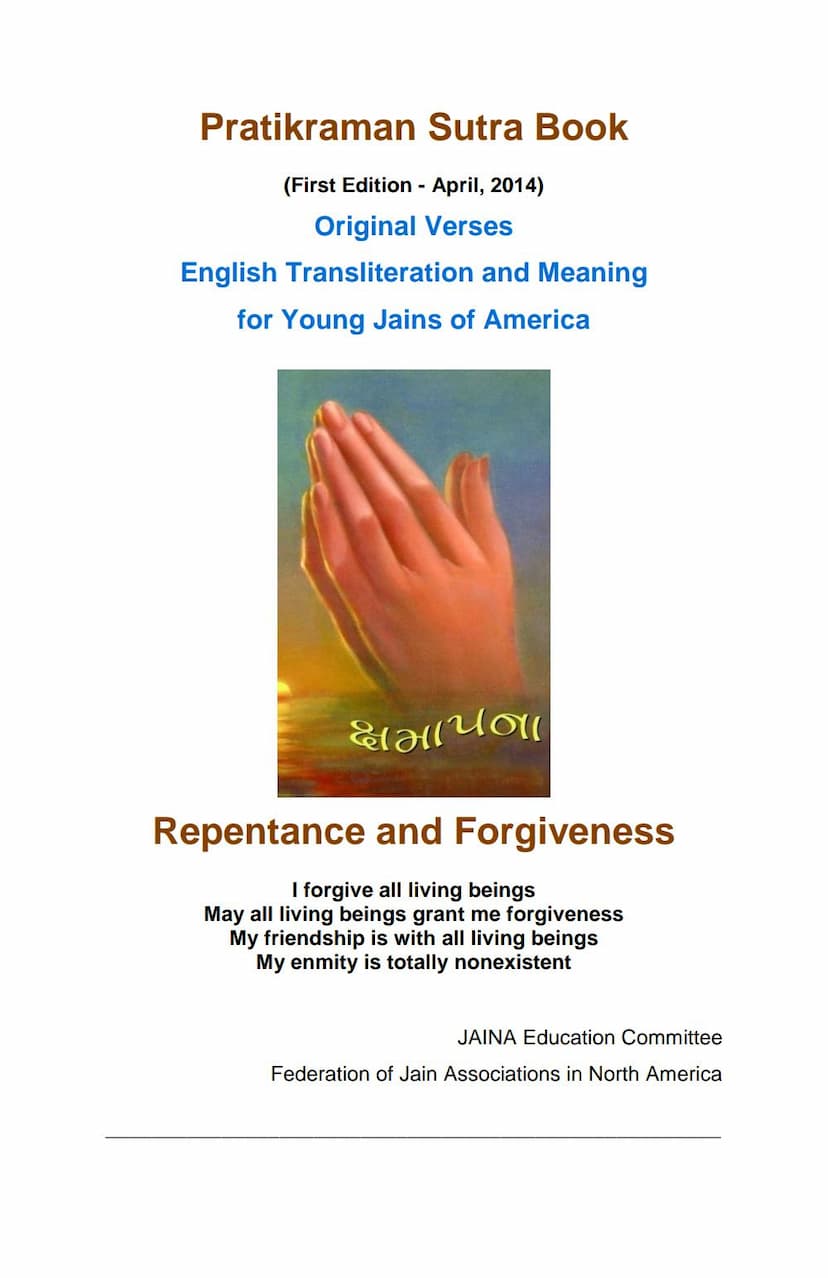JES 941 Pratikraman Sutra Book In English
Added to library: September 1, 2025

Summary
This document, "Pratikraman Sutra Book (JES 941)" published by the JAINA Education Committee, is a comprehensive guide to the Jain ritual of Pratikraman, presented in English for young Jains in America.
Pratikraman is described as an observance of self-reflection, repentance, and forgiveness. The book explains that Jainism's ultimate goal is the liberation of the soul by removing impurities like ignorance (Mithyätva) and vices (Kashäyas). To achieve this, six essential daily practices, known as Ävashyakas, are prescribed: Sämäyika (equanimity), Chaturvimshati-stava (praise of Tirthankaras), Vandana (respecting ascetics), Pratikraman (repentance and confession), Käyotsarga (meditation), and Pratyakhyana (taking vows).
The book highlights that the Pratikraman ritual has evolved to encompass all six Ävashyakas, making it a central practice in Jainism, comparable to similar devotional acts in other religions. It emphasizes that performing these rituals is only spiritually beneficial if they lead to a reduction in ignorance and vices.
The Pratikraman Sutra Book provides the original verses in Ardhamagadhi Prakrit and Sanskrit, along with their English transliteration and meaning. It also includes introductions to each sutra, explaining its significance and context within the Pratikraman ritual.
Key sections of the book cover:
- Introduction to Pratikraman: Explaining its purpose of self-reflection, confession of sins, and seeking forgiveness.
- The Six Ävashyakas: Detailing the meaning and practice of each essential ritual.
- Specific Sutras: A detailed breakdown of numerous sutras recited during Pratikraman, including:
- Namaskar Mangal Sutra (Navkar Mantra): The foundational prayer of obeisance to the Pancha Parmeshtis (Arihanta, Siddha, Acharya, Upadhyay, Sadhu).
- Chattari Mangalam Sutra: Declaring the auspiciousness of the Pancha Parmeshtis and the Jain religion.
- Universal Prayers: Including prayers for forgiveness, peace, and universal well-being.
- Guru Sthapanä Sutra (Panchindiya Sutra): Indicating respect and veneration for spiritual teachers.
- Ichchhami Khamasmano Sutra: A formal bow of respect.
- Irya Vahiyäe Sutra: A prayer seeking forgiveness for unintentional harm caused while moving.
- Tassa Uttari Sutra: Declaring the intention to perform Käyotsarga for atonement.
- Annattha Sutra: Describing exemptions for involuntary bodily movements during meditation.
- Logassa Sutra: Praising the virtues of the 24 Tirthankaras.
- Karemi Bhante Sutra: Vowing to undertake Sämäyika.
- Samaiya Vaya Jutto Sutra: Terminating the Sämäyika vow.
- Chaitya Vandan Sutras (Jag Chintamani, Jam Kinchi, etc.): Prayers for venerating temples and images of Tirthankaras.
- Sädhu Vandan Sutras (Javanta Ke Vi, Addhaijjesu): Showing respect to monks and nuns.
- Praise Sutras (Uvasagga-Haram, Jaya Viyaraya, Kallana-Kandam, Sansara-Dava-Nala, Laghu-Shanti, etc.): Devotional hymns praising Tirthankaras, scriptures, and divine beings.
- Sutras for Repentance (Icchami Thami, Panchacara Atichara, Devasiam Aalou, Sat Lakha, Athara Papsthanak, Savvassa Vi, Devasia Padikkamane, Vandittu, Abbhutthio): Detailed confessions of sins and violations of vows.
- Recitation and Postures: Guidance on the proper Chhanda (meter/recitation style) for each sutra and the correct postures (Mudras) to adopt during the ritual, with accompanying illustrations.
- Muhapatti Padilehana: Detailed instructions and illustrations for the ritualistic cleaning and inspection of the Muhapatti (a cloth used by monks and nuns to cover their mouth, symbolizing non-violence in speech).
- Pachchakkhäna: Instructions for morning and evening vows (fasts) related to food and activities.
The book also includes a significant note on a modification made to a Sanskrit stanza in the Jaya Viyaraya Sutra, explaining that the change was made to align with Jain principles of Anekantvad and the American cultural environment. It emphasizes the book's purpose of educating Jain youth in a culturally relevant manner.
Overall, "Pratikraman Sutra Book" serves as a foundational text for understanding and practicing the essential Jain ritual of Pratikraman, promoting self-awareness, ethical conduct, and spiritual growth.